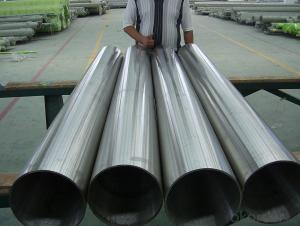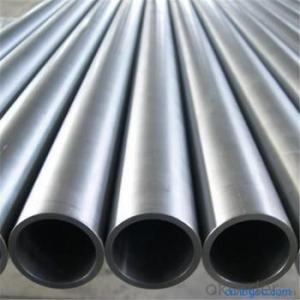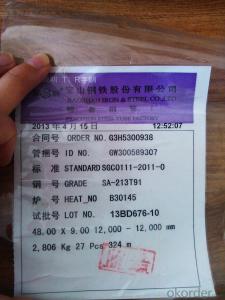ASTM A213 T91 boiler tube 25
- Loading Port:
- Shanghai
- Payment Terms:
- TT OR LC
- Min Order Qty:
- -
- Supply Capability:
- 30000 kg/month
OKorder Service Pledge
OKorder Financial Service
You Might Also Like
Alloy pipe stock grade A335P11/P22/P12/P91/P92/P9/P5 A213 T11/T22/T12/T91/T91/T9/T5
T91 alloy pipe is America national tree like ridge and America combustion new martensitic heat-resistant steel engineering company metallurgical materials laboratory research work. It is to reduce the carbon content of 9Cr1MoV steel on the basis of the content of sulphur, phosphorus, strictly limit the vanadium, niobium, adding small amount of alloying elements.
The number of K90901 T91 alloy tube
T91 alloy tube
T91 alloy pipe specifications: 8-1240 x 1-200mm
Overview of T91 alloy tube:
T91 alloy tubes for ferrite and Olympic alloy steel seamless steel tube boiler, overheating and heat exchanger belongs to (ASTM A213 / A213M-07a)
Use:
For low and medium pressure boiler (work pressure is generally not more than 5.88Mpa, the operating temperature at 450 DEG C) of the heating surface tube; used for high pressure boiler (work pressure is generally above 9.8Mpa, operate at a temperature of 450 DEG to 650 DEG C between) the heating surface tubes, economizer, superheater, reheater, petrochemical industrial pipe.
Heat treatment of T91 alloy tube:
The final heat of T91 treatment for normalizing and high temperature tempering, normalizing temperature 1040 C, the holding time of not less than 10 min, the tempering temperature is 730 to 780 DEG C, the heat preservation time is not less than 1h, the final heat treatment on Microstructure of tempered martensite
- Q:What are the advantages of using steel pipes over other materials like PVC or copper?
- There are several advantages of using steel pipes over other materials like PVC or copper. Firstly, steel pipes are extremely durable and can withstand high pressure and extreme temperatures, making them ideal for various applications including industrial and underground use. Secondly, steel pipes have a longer lifespan compared to PVC or copper, reducing the need for frequent replacements and maintenance. Additionally, steel pipes are more resistant to corrosion and are not prone to cracking or leaking, ensuring a reliable and leak-free plumbing system. Lastly, steel pipes have a higher fire resistance rating compared to PVC, making them a safer option for certain environments.
- Q:What does carbon seamless steel pipe mean? What is the difference between a seamless 20# and an ordinary one? What is it used in detail?
- Carbon steel is actually relative to alloy steel, mainly carbon content, and 20# seamless steel is carbon steel! In addition, there are stainless steel, stainless steel is considered a kind of alloy steel, but the processing is not the same, the performance is not the same, good looking outside!The description of the material in alloy steel is actually the content of the metal elements in the steel (usually the percentage number).
- Q:What are the different grades of steel used for pipes?
- There are several different grades of steel used for pipes, each with their own specific properties and applications. Some of the most commonly used grades include: 1. Carbon Steel: This is the most common type of steel used for pipes and is typically used in low-pressure applications. It has a low carbon content, usually less than 0.30%, which makes it easy to weld and form. Carbon steel pipes are durable and cost-effective, making them suitable for a wide range of industries. 2. Stainless Steel: Stainless steel pipes are known for their corrosion resistance and high strength. They are made from an alloy of iron and chromium, with additional elements like nickel and molybdenum to enhance their properties. Stainless steel pipes are commonly used in industries such as chemical, food processing, and oil and gas, where corrosion resistance is crucial. 3. Alloy Steel: Alloy steel pipes are made by adding elements such as manganese, chromium, or nickel to carbon steel. This enhances their strength, hardness, and resistance to wear, making them suitable for high-pressure and high-temperature applications. Alloy steel pipes are commonly used in industries such as power generation, petrochemical, and aerospace. 4. Duplex Steel: Duplex steel is a type of stainless steel that contains a combination of austenite and ferrite phases. This results in a material with excellent strength, corrosion resistance, and toughness. Duplex steel pipes are commonly used in offshore oil and gas platforms, as well as in chemical and petrochemical industries. 5. Low-Temperature Steel: Low-temperature steel is designed to withstand extremely cold temperatures without becoming brittle. These pipes are typically used in industries such as cryogenic storage, LNG (liquefied natural gas) transportation, and refrigeration. It is important to select the appropriate grade of steel for a specific application to ensure the pipe's performance and longevity. Factors such as temperature, pressure, corrosion resistance, and cost should be considered when choosing the grade of steel for pipes.
- Q:Can steel pipes be used for fire sprinkler systems?
- Yes, steel pipes can be used for fire sprinkler systems.
- Q:Can steel pipes be used for underground transportation tunnels?
- Underground transportation tunnels can indeed utilize steel pipes. For a multitude of purposes like water, gas, and sewage transportation, steel pipes are commonly employed in the construction of these tunnels. Renowned for their resilience, durability, and ability to resist corrosion, steel pipes are remarkably suitable for underground applications. With the capacity to endure the weight and pressure exerted by the nearby soil, they can also be reinforced to guarantee stability. Moreover, steel pipes offer flexibility in tunnel design as they can be manufactured in various sizes and lengths. Nonetheless, one must carefully consider factors such as soil conditions, load-bearing capacity, and potential environmental impacts before opting for steel pipes in underground transportation tunnels.
- Q:How are steel pipes used in the manufacturing of bridges?
- Steel pipes are commonly used in the manufacturing of bridges for various purposes such as the construction of bridge piers, support columns, and structural elements. These pipes provide strength, durability, and flexibility to withstand heavy loads and harsh environmental conditions. They are often used to create the framework and support systems of the bridge, ensuring stability and longevity. Additionally, steel pipes may be used for the transportation of fluids, such as water or gas, across the bridge.
- Q:How do you prevent leaks in steel pipes?
- One effective way to prevent leaks in steel pipes is by implementing a regular maintenance and inspection schedule. This includes checking for any signs of corrosion, damage, or wear and tear on the pipes. Additionally, using high-quality coatings or protective materials on the pipes can help minimize the risk of leaks by providing an extra layer of protection against external factors. Proper installation techniques and ensuring a secure connection between pipe joints are also crucial in preventing leaks.
- Q:What are the different methods of threading steel pipes?
- There are several methods of threading steel pipes, including manual threading, machine threading, and dielectric threading. Manual threading involves using a manual pipe threader or a handheld die to create the threads on the pipe. Machine threading, on the other hand, utilizes power-driven machines that can thread multiple pipes simultaneously, increasing efficiency and accuracy. Dielectric threading is a specialized method that uses a high-frequency electrical current to generate threads on the pipe, which is commonly used for stainless steel pipes.
- Q:Can steel pipes be used for conveying solid materials?
- Yes, steel pipes can be used for conveying solid materials. Steel pipes are commonly used in industries such as construction, oil and gas, and mining to transport solid materials such as ores, coal, grains, and various other solid substances. The durability and strength of steel make it suitable for handling the weight and pressure of solid materials during transportation.
- Q:How do you determine the maximum allowable stress for a steel pipe?
- To determine the maximum allowable stress for a steel pipe, several factors need to be considered. Firstly, the type of steel used in the pipe is crucial as different types of steel have different mechanical properties and strengths. Secondly, the dimensions and thickness of the pipe play a significant role in determining its maximum allowable stress. Thicker pipes generally have higher allowable stresses compared to thinner ones. Additionally, it is important to consider the operating conditions under which the pipe will be subjected. This includes factors such as the temperature, pressure, and the type of fluid flowing through the pipe. These conditions can greatly affect the maximum allowable stress as high temperatures or corrosive fluids may weaken the steel and reduce its strength. To determine the maximum allowable stress, engineers typically refer to industry standards and codes such as the American Society of Mechanical Engineers (ASME) Boiler and Pressure Vessel Code and the American Petroleum Institute (API) standards. These standards provide guidelines and formulas for calculating the maximum allowable stress based on the material properties, dimensions, and operating conditions of the pipe. It is important to note that determining the maximum allowable stress is a critical step in ensuring the structural integrity and safety of the steel pipe. It requires a thorough understanding of the materials, design considerations, and industry standards. Therefore, it is recommended to consult with experienced engineers or professionals who specialize in piping design and analysis to accurately determine the maximum allowable stress for a steel pipe.
1. Manufacturer Overview |
|
|---|---|
| Location | |
| Year Established | |
| Annual Output Value | |
| Main Markets | |
| Company Certifications | |
2. Manufacturer Certificates |
|
|---|---|
| a) Certification Name | |
| Range | |
| Reference | |
| Validity Period | |
3. Manufacturer Capability |
|
|---|---|
| a)Trade Capacity | |
| Nearest Port | |
| Export Percentage | |
| No.of Employees in Trade Department | |
| Language Spoken: | |
| b)Factory Information | |
| Factory Size: | |
| No. of Production Lines | |
| Contract Manufacturing | |
| Product Price Range | |
Send your message to us
ASTM A213 T91 boiler tube 25
- Loading Port:
- Shanghai
- Payment Terms:
- TT OR LC
- Min Order Qty:
- -
- Supply Capability:
- 30000 kg/month
OKorder Service Pledge
OKorder Financial Service
Similar products
New products
Hot products
Related keywords































